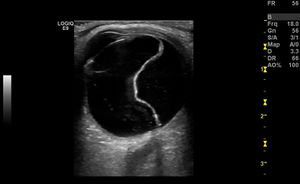Ocular ultrasound: Difference between revisions
(added picture) |
(link to vit hemorrhage) |
||
| Line 25: | Line 25: | ||
[[File:Retinal detachment.jpg|thumb|Retinal detachment ultrasound]] | [[File:Retinal detachment.jpg|thumb|Retinal detachment ultrasound]] | ||
==Vitreous Hemorrhage== | ==[[Vitreous Hemorrhage]]== | ||
*Vitreous filled with multiple large echoes | *Vitreous filled with multiple large echoes | ||
*Increasing the gain is helpful for detecting acute hemorrhages | *Increasing the gain is helpful for detecting acute hemorrhages | ||
Revision as of 20:56, 27 July 2014
Technique
- Use vascular/linear probe
- Plenty of ultrasound gel to decrease amount of pressure needed to place on eye
Elevated ICP
- Measure optic nerve 3mm posterior to the globe, from inner wall to inner wall
- Normal is <5mm
Globe Rupture
- Only perform if you can ensure that you do not put pressure on the globe
- Findings
- Decrease in size of globe
- Anterior chamber collapse
- Vitreous hemorrhage
- Buckling of the sclera
- see Globe Rupture
Intraocular Foreign Body
- Bright, echogenic acoustic profile w/ associated shadowing or reverberation
Retinal Detachment
- Echogenic undulating membrane in the posterior globe, protruding into the vitreous
- Evaluate with patient moving eye left/right
Vitreous Hemorrhage
- Vitreous filled with multiple large echoes
- Increasing the gain is helpful for detecting acute hemorrhages
See Also
Source
Sonoguide




